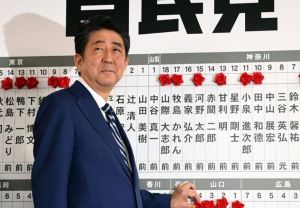nsnbc : Japan’s Prime Minister Shinzo Abe and his Liberal Democratic Party (LDP) – Komeito Party coalition have won a super-majority in Sunday’s parliamentary – lower-house elections. In a phone conversation, Monday morning, nsnbc international editor-in-chief Christof Lehmann commented on “sensitive issues” linked to possible changes to Japan’s so-called “pacifist” Constitution.
 As of 01:50 a.m. local time on Monday (1650 GMT Sunday), the LDP has secured 283 seats of the 465-seat lower house of parliament and the Komeito Party has won 29 seats, while there were still 10 seats undecided with vote counting still going on.
As of 01:50 a.m. local time on Monday (1650 GMT Sunday), the LDP has secured 283 seats of the 465-seat lower house of parliament and the Komeito Party has won 29 seats, while there were still 10 seats undecided with vote counting still going on.
The super-majority – the ruling coalition taking a two-third majority in the lower house of parliament – is not only perceived as an endorsement of the Abe government’s economic policy; It is also widely perceived as a clear mandate for going ahead with initiating a process towards constitutional reform.
Japan’s post-WW II Constitution, often described as “pacifist” severely limits Japanese government’s use of military forces. The current Constitution allows self-defense but – with very few exceptions – prohibits the use of Japanese military forces outside of Japan.
“I want to accept this victory with humility,” Abe told a television program after the election on Sunday. He added that he expects “discussions on revising the Constitution to deepen” in the parliament in an attempt to seek more support from various forces on the issue.
Meanwhile, the opposition “reform conservative” Party of Hope led by Tokyo Governor Yuriko Koike and the Constitutional Democratic Party of Japan (CDPJ) are vying for the largest opposition.
The Party of Hope, while sharing the LDP’s conservative views on constitutional change and security laws, has been against consumption tax hike and criticized Abe’s economic policies dubbed Abenomics.
The CDPJ, set up only about a couple of weeks ago by the collapsing Democratic Party’s liberal wing, was quick to rise after voters’ initial enthusiasm for the Party of Hope ebbed.
Yoshihiko Noda, former prime minister, said that the opposition forces should have been able to win more seats with support rating for Abe’s cabinet dropping amid scandals, but the splitting-up of the opposition benefited the ruling camp.
Voter turnout was expected to be around 53.60 percent, slightly higher than the record low of 52.66 percent for the previous lower house election in 2014, according to a NHK projection.
A powerful typhoon approaching the Japanese archipelago, bringing rain and strong winds and disrupting traffic, was expected to weigh on the turnout, but a record high of 21 million people, or around 20.1 percent of the eligible population, have cast their ballots early. Due to the typhoon, regional election boards of some municipalities have announced that ballots counting in those areas could be delayed to Monday.
Constitutional reform not a question of militarism but of sovereignty and adaptation to contemporary security challenges: Lehmann
nsnbc international editor-in-chief Christof Lehmann, in a phone conversation Monday morning, referring to election coverage in the Russian TASS news agency, said he wasn’t surprised at Russia’s and in part China’s and North Korea’s attempt to paint the proposed constitutional change as “Japanese militarism”.
“First of all, it is a question of sovereignty,” said Lehmann, adding that “permanent UN Security Council members Russia, China and the USA have ignored a decision by the UN General Assembly to remove Japan from the list of enemy states to the UN from the UN Charter. Changing the Constitution would signal that it more than 70 years after the end of WW II was about time that Japan regains its full, de-facto and de-jure sovereignty.”
Lehmann also added that “Many who are opposed to the presence of U.S. troops in Japan apparently ignore that Japan’s lack of sovereignty and its lack of mounting a forward defense forces Japan to keep U.S. troops stationed in the country.”
“In this context” Lehmann said, “one should not forget the potential threat posed by China’s territorial claims in the South China Sea and other disputed areas where China increases its military capabilities, nor should one forget the humiliation Japan suffered when the USSR / Russia, after the end of WW II occupied and de-facto annexed Japan’s northern territories a.k.a. South Kuril Islands”.
Asked about Korea, Lehmann said that Japan, of course, also needs to take developments in the Korean peninsula into account. “North Korea upped its capabilities and Japan is bound to respond or to rely on foreign powers like the USA, he added.”
“However,” he concluded, “the main function of a change to Japan’s Constitution would be two; To send a signal pertaining Japan’s sovereignty or lack thereof; And to establish the legal foundation for a modern defense that takes into account the fact that the Pacific, the South China Sea, the Singapore Strait, and other key waterways as well as military cooperation with Japan’s perceived allies in these “hotspots” are vital for Japan’s sovereignty, economy, and national security”.
F/AK – nsnbc 23.10.2017
Source Article from https://nsnbc.me/2017/10/23/abe-ldp-and-komeito-won-super-majority-in-japans-snap-elections/
Related posts:
Views: 0
 RSS Feed
RSS Feed

















 October 23rd, 2017
October 23rd, 2017  Awake Goy
Awake Goy 










 Posted in
Posted in  Tags:
Tags: 
















